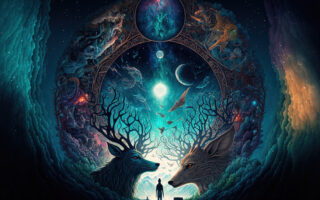On the deconstruction of a myth
Author: Messanh Amadegnato
Few spiritual traditions have been more discredited by racial prejudice than Vodou. Everyone is familiar with Vodou dolls, which are used to do evil to other people. In fact, however, Vodou is the traditional African spirituality that is prevalent everywhere south of the Sahara and in the African diaspora. Through oracles and trance states, people communicate with deities to gain healing and alignment. Togolese Vodou priest Messanh explains to us in an interview what the negative energies are all about.
Tattva Viveka: Today we talk to Messanh Amadegnato about UCTT [L’Union des Cultes Traditionels du Togo, website: https://www.uctt-togo.org/] in Togo, an organization that promotes Togolese culture. He asked his colleague Mathilde ter Heijne to interview him about it. Messanh, what led you to found the organization UCTT, and what is its mission?
Messanh: My priest name is Togbé Hounon Hounougnbo Bahounsou. I have lived in Germany for 25 years and founded this organization about four years ago because I had often heard so much negative things about people from Africa in Germany. Many Germans have a bad image of Africa and the culture, especially of Vodou. With this organization I would like to bring other people closer to our culture. The members of our organization meet once a month in my home village, which is not far from Lomé, the capital of Togo. At the meetings, we talk about what we can improve and determine the tasks that each member is responsible for. If someone has a problem, UCTT members meet and try to solve it.
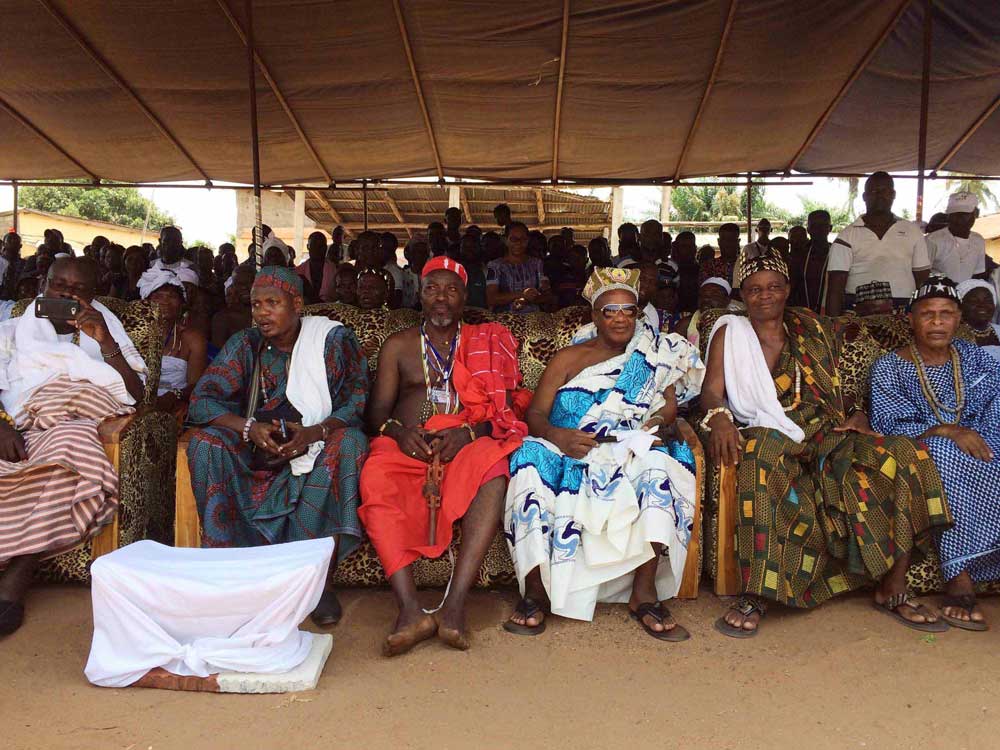 Hounoun Hounougbo Amedegnato with right Alofa, Chef du Canton Ageougan, and other priests* of UCTT.
Hounoun Hounougbo Amedegnato with right Alofa, Chef du Canton Ageougan, and other priests* of UCTT.
CURRENT PROJECTS
TV: What project are you currently pursuing?
Messanh: At the moment we are working, also with UCTT Berlin, to build a kind of cultural center in Togo. The village of Aguégan has donated land to us. We would like to erect a building there that can be used by many, and offer seminars, among other things. There, we also want to create spaces where Vodou objects that are no longer used by their owners or that go back from collections to the country of origin, can get a new sacred environment and become ‘active’ again.
Mathilde: All this takes a lot of time. A difficult task is to unite the priests and involve everyone. Along the way, we pursue the interest of establishing a constant cultural exchange between Germany and Togo. Especially because Togo is a former colony of Germany and there is a collection of Togolese art objects in Germany.
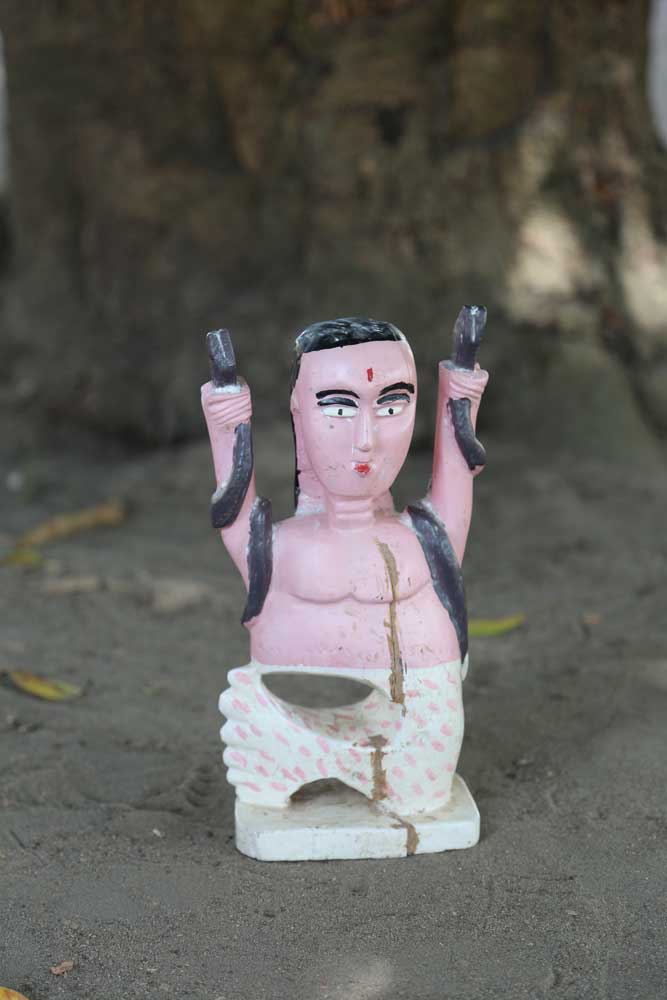 Mami Wata, a return object
Mami Wata, a return object
TV: What exactly is Vodou? What is its spiritual tradition?
Messanh: First of all, Vodou is a religion like any other. It is the name for a global spiritual matter. For example, in Vodou, as in other religions, there are temples, or houses of worship. These temples exist for many gods and they have great power. The word “Vodou” comes from “voo” in the Yoruba language. A vodou refers to a spiritual spirit, a place, a vodou temple. It is another name for ‘deity’. I myself have always wondered why people outside of religion are afraid of it.
One of the biggest prejudices is the Vodou doll, which transfers the ‘injuries’ inflicted on it to a certain person. However, this is not true.
In my opinion, it is not the religion itself that is bad, but the people who misuse it for their evil intentions. There are both forces, the good and the bad. But our ancestors always said you must not use this negative energy for its own sake.
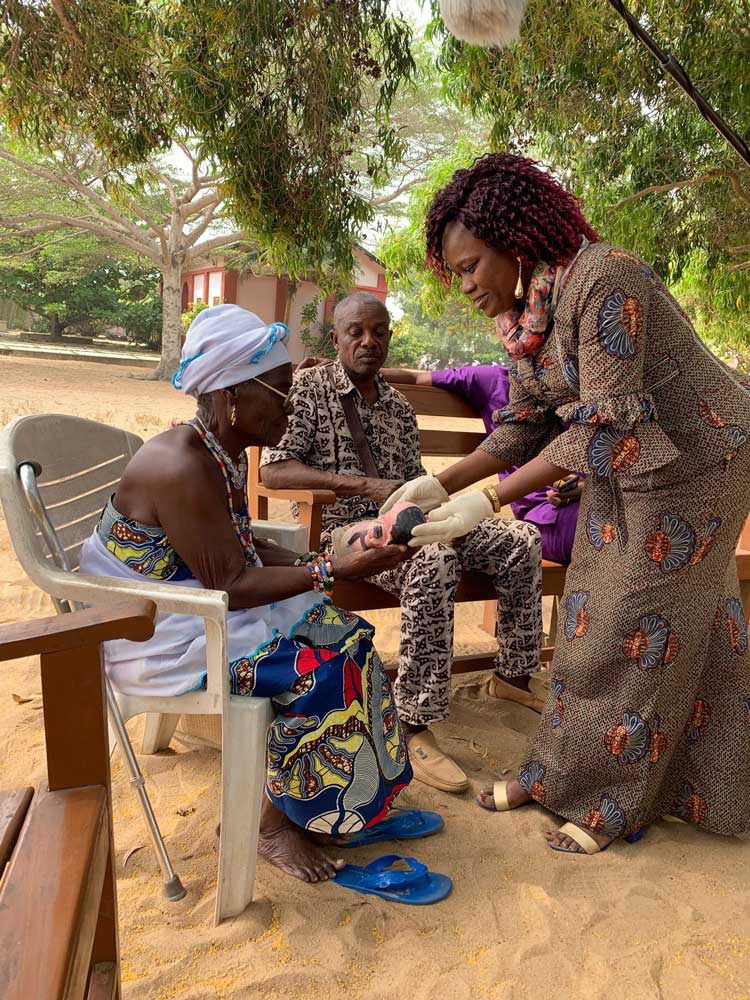 Georgette Single of Villa Karo, Mamissi DaPovi and Ananin Ghanganisou (both members of UCTT) with a Mami Wata sculpture being returned. Handing over the sculpture at Villa Karo.
Georgette Single of Villa Karo, Mamissi DaPovi and Ananin Ghanganisou (both members of UCTT) with a Mami Wata sculpture being returned. Handing over the sculpture at Villa Karo.
The good in Vodou is always in the foreground.
But sometimes the negative forces are abused and that is not good, not even for the priest*. Overall, it is a spiritual energy. We call upon the goddesses and gods and consult an oracle. In the oracle we find out if it is a curse. Then we pray to the respective deities. Here the evil forces are separated from the good forces. In case of a normal illness we call on the good forces. But to fight a curse, we need the evil forces.
People fly to Togo or Benin as tourists and get to the wrong people. Any little kid can cheat you there.
You have to find serious people who can give you good answers. Vodou is not an evil thing in itself. Evil is everywhere, in Bavaria, in China. But of Africa, many people have the image that it is fundamentally evil. With our organization we try to help people to find more easily a way to serious priests, and we fight against related prejudices.
MANY DEITIES
TV: What deities are there?
Messanh: Quite a few, for example, the Thunderstorm God, Mother Earth, Air Gods, Snake Gods, the Rainbow God, etc. Primarily, as priests, we work with the four elements. This is universal throughout the world. Every shaman or Catholic priest works with this. However, many of these ceremonies require a certain level of experience. Because many different priests have a different focus, a ceremony or ritual very often requires cooperation to gather this power. This is another reason why I started the organization: to create a network of priests and experts. In the past, these things were done through family and kinship relationships. This ensured honesty and trust. Today, this is done through our group, but again, honesty and trust are essential. When the people in Togo know that I am coming, they all want something from me. Then we meet and discuss it together.
TV: Is there also a supreme deity in your spirituality?
Messanh: We say Hévièsso is our supreme god. Hévièsso needs water, air, fire, earth. He can’t work without those. But Mother Earth is the wife of Hévièsso. She is the oldest woman. Hévièsso is fiery and stormy. Maybe he sends a tornado. But Mother Earth then tells him to slow down because there are children on Earth.
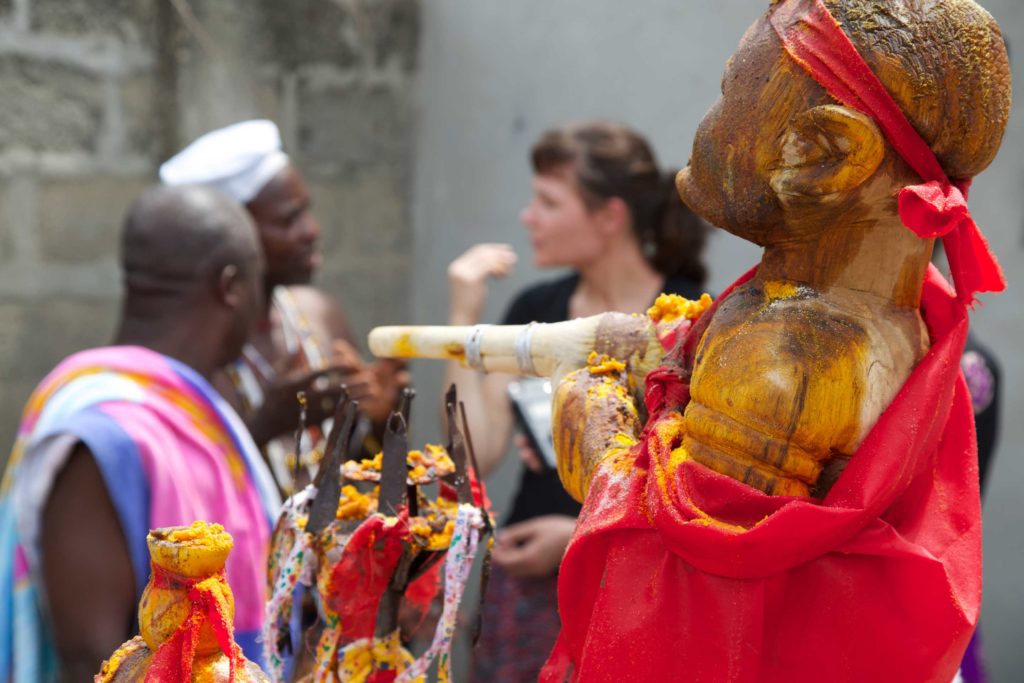 In the temple of Messanh with Toulabo (Hévièsso) in the foreground.
In the temple of Messanh with Toulabo (Hévièsso) in the foreground.
TV: Is Vodou generally African or only West African?
Messanh: Vodou is everywhere in Africa, but also in Brazil, Haiti, etc. People from Latin America also perform the rituals, for example, there is Santería in Cuba, Candomblé in other Latin American countries – these are syncretic hybrids, but they all go back to Vodou. In the African diaspora, all practices are made up of different hybrid forms.
It is important to understand that Vodou is practiced together with the community.
If the community is not strong, then the Vodou priest stands alone. Then he has no dancers, no drummers. That means there is no ceremony – then the gods have no place to come. That’s how things go really wrong. But when there is a whole community involved, it is very difficult to do anything bad, because people would notice and not approve.
That’s why all these prejudices against Vodou are not tenable in my eyes and show racism. Educating people about this is also one of our goals, and we are looking for good ways to communicate that. As an artist, I’m racking my brain about what form that should take. The approach via museums and ethnology could possibly be more effective than posting something on the Internet every now and then. That’s why we are careful with interviews, so that the content is not misrepresented.
These misconceptions of Western thinking are reproduced again and again.
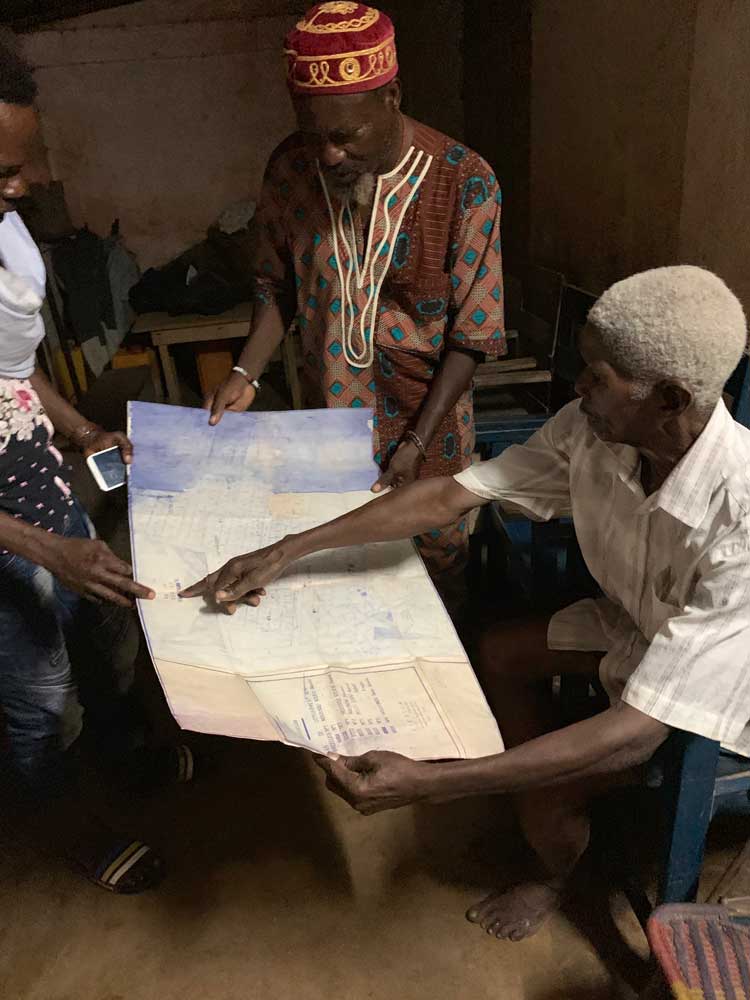 Members of the UCTT
Members of the UCTT
Messanh: The last time I was at the Shaman Congress, I met a shaman from Nepal. He looked at me very skeptically and didn’t want to take me in his arms. Then, when I was wearing my priestly robe, his translator came to me and whispered in my ear that this was the first time the shaman had seen a Vodou priest, and that was why he was afraid. Later we were on stage and each presented his work. In the afternoon, the shaman wanted to talk to me. He said he only knew Vodou from TV, but had never met a Vodou priest live. He asked if he could shake my hand. I replied why not. Then he wanted to take a picture with me. I, of course, agreed to that as well.
Later, a question and answer session was held. One participant asked, “What can we do if someone is cursed?” The shamans came forward one by one and gave an answer. I, however, remained silent. Then the Nepalese shaman stood up and said, “The only one who can do that is the Vodou priest. We don’t have that power. The Africans are very strong in the energy of good and evil forces.” I still remained seated, but was then asked to speak. I explained how strong Vodou was and what we can do with it. Then came so many questions from the audience, whether it was black magic, etc.
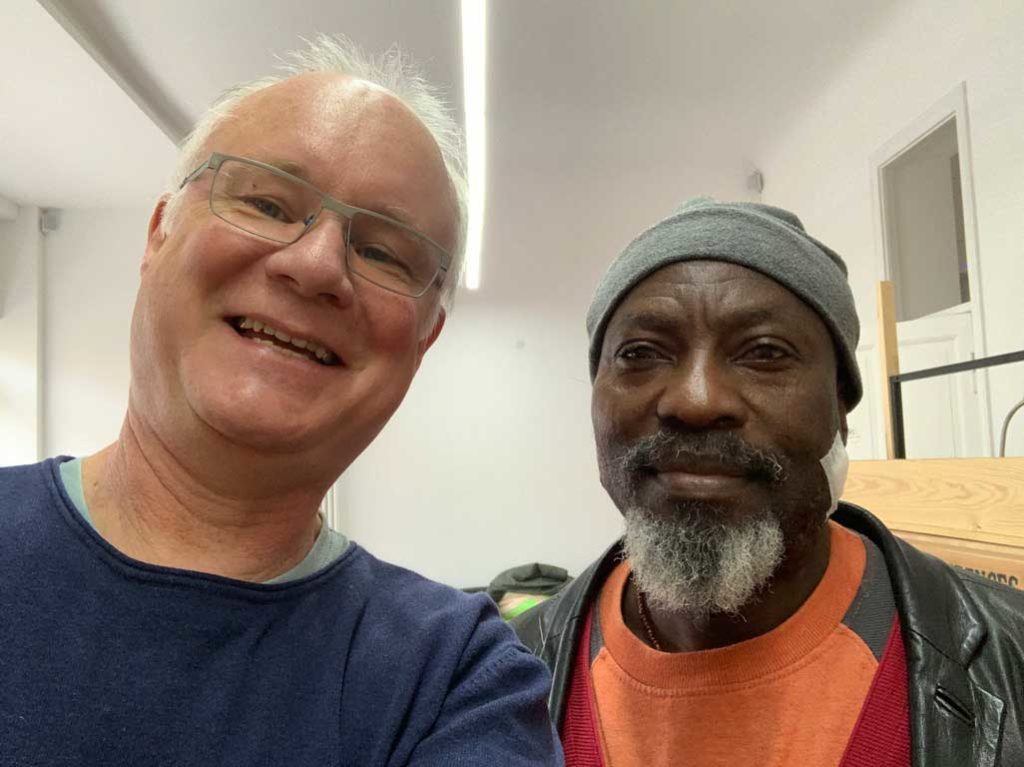 The Editor-in-Chief of Tattva Viveka Ronald Engert with Messanh Amadegnato
The Editor-in-Chief of Tattva Viveka Ronald Engert with Messanh Amadegnato
I must point out, however, that if you go to Africa, you must know someone reputable. Then you can do everything there. When people want to do shamanic work in Germany, they usually travel to Asia or Latin America. Nobody goes to Africa because everybody is afraid. But there is good stuff in Africa. There are great seminars in Togo, for example about plant medicine. The tradition is the same everywhere in West Africa. Only the languages are different. Don’t worry, there’s nothing to be afraid of.
TV: Thank you for the enlightening presentation. I think it is time to put aside the ignorance and prejudices about Africa. Thank you for letting us share in the richness and beauty of Africa’s spiritual culture.
The interview was conducted by Ronald Engert.
About the author
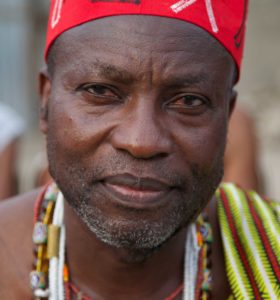 Messanh Amadegnato is a Vodou priest and director of “L’Union des Cultes Traditionels du Togo” (UCTT). He was born in Togo, West Africa, and came to Germany in the mid-1990s. In 2012, he was officially appointed High Priest of Vodou Hévièsso with the title Togbé Hounon Hounougnbo Bahounsou.
Messanh Amadegnato is a Vodou priest and director of “L’Union des Cultes Traditionels du Togo” (UCTT). He was born in Togo, West Africa, and came to Germany in the mid-1990s. In 2012, he was officially appointed High Priest of Vodou Hévièsso with the title Togbé Hounon Hounougnbo Bahounsou.
Website: L’Union des Cultes Traditionels du Togo
This article appeared originally on the German Homepage of Tattva Viveka: Die wahre Bedeutung von Vodou




